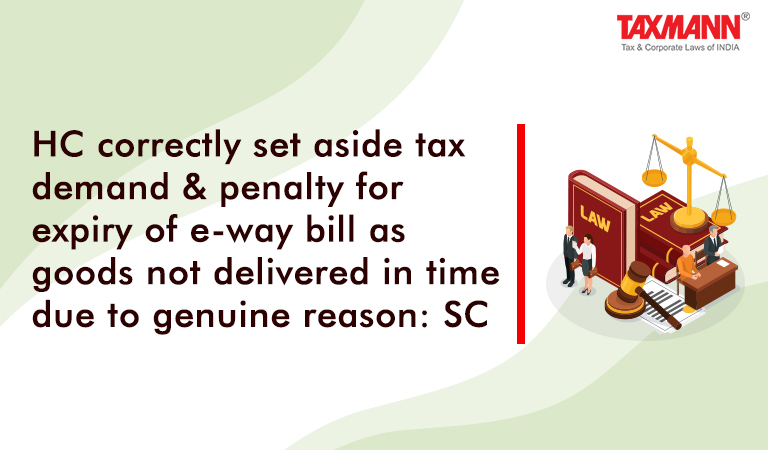HC correctly set aside tax demand & penalty for expiry of e-way bill as goods not delivered in time due to genuine reason: SC
- Blog|News|GST & Customs|
- 2 Min Read
- By Taxmann
- |
- Last Updated on 25 January, 2022

Case Details: Assistant Commissioner (ST) v. Satyam Shivam Papers (P.) Ltd. - [2022] 134 taxmann.com 241 (SC)
Judiciary and Counsel Details
-
- Dinesh Maheshwari and Hrishikesh Roy, JJ.
- P. Venkat Reddy, Prashant Tyagi and P. Srinivas Reddy, Advs. for the Petitioner.
Facts of the Case
The auto trolley of assessee-distributor which was on its way for delivery of paper to buyer/consignee was detained by Deputy State Tax Officer on ground that validity of E-way bill had expired. The tax and penalty was levied and it filed writ petition before the High Court.
The Honorable High Court observed that there was no material before revenue to come to conclusion that there was evasion of tax by assessee. Merely on account of non-extension of validity of E-way bill by assessee or auto trolley driver, no presumption could be drawn that there was an intention to evade tax and therefore, order levying tax and penalty was to be set aside. The revenue filed special leave petition before the Apex Court.
Supreme Court Held
The Honorable Supreme Court observed that goods in question could not be taken to the destination within time for reasons beyond the control of assessee including traffic blockage due to agitation. The State alone remains responsible for not providing smooth passage of traffic. Therefore, it was held that the order by High Court setting aside tax demand and penalty for expiry of e-way bill when goods could not be delivered within validity period because of traffic blockage was correct.
Disclaimer: The content/information published on the website is only for general information of the user and shall not be construed as legal advice. While the Taxmann has exercised reasonable efforts to ensure the veracity of information/content published, Taxmann shall be under no liability in any manner whatsoever for incorrect information, if any.

Taxmann Publications has a dedicated in-house Research & Editorial Team. This team consists of a team of Chartered Accountants, Company Secretaries, and Lawyers. This team works under the guidance and supervision of editor-in-chief Mr Rakesh Bhargava.
The Research and Editorial Team is responsible for developing reliable and accurate content for the readers. The team follows the six-sigma approach to achieve the benchmark of zero error in its publications and research platforms. The team ensures that the following publication guidelines are thoroughly followed while developing the content:
- The statutory material is obtained only from the authorized and reliable sources
- All the latest developments in the judicial and legislative fields are covered
- Prepare the analytical write-ups on current, controversial, and important issues to help the readers to understand the concept and its implications
- Every content published by Taxmann is complete, accurate and lucid
- All evidence-based statements are supported with proper reference to Section, Circular No., Notification No. or citations
- The golden rules of grammar, style and consistency are thoroughly followed
- Font and size that’s easy to read and remain consistent across all imprint and digital publications are applied



 CA | CS | CMA
CA | CS | CMA
